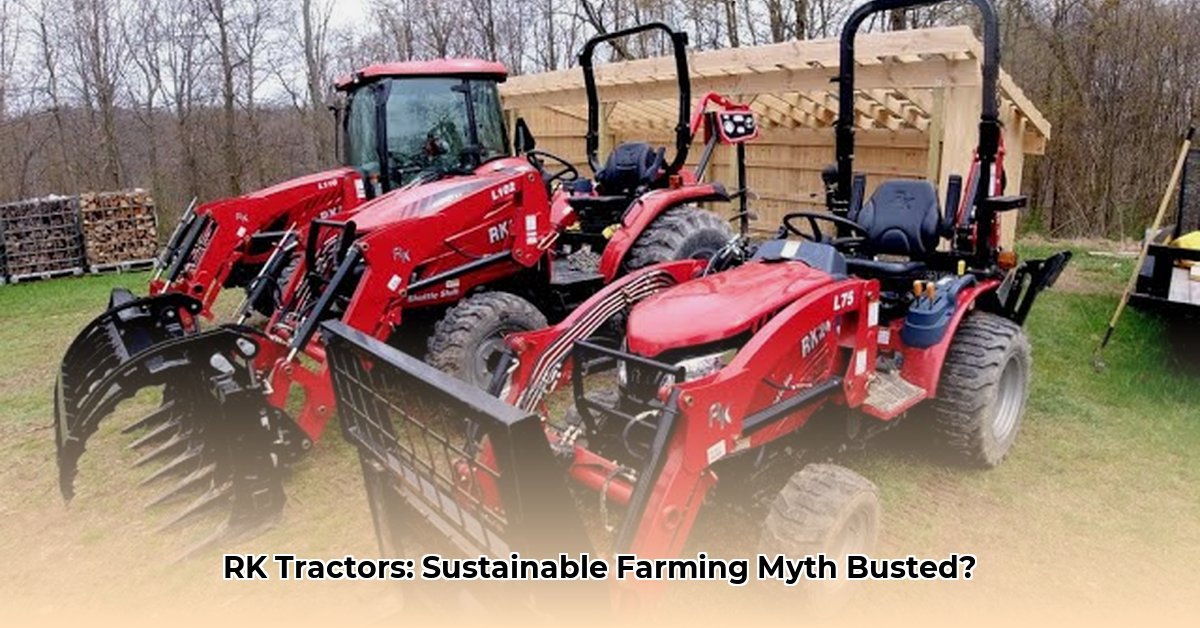
Are RK Tractors a Sustainable Choice for Your Farm?
Rural King (RK) tractors, often touted for their affordability, present a complex dilemma for budget-conscious farmers. While the low initial price is alluring, particularly for smaller operations or those just starting out, the long-term reliability and associated costs deserve careful consideration. This review examines farmer experiences, analyzes potential risks, and provides actionable steps to make an informed decision. For more in-depth reviews, check out this helpful resource: additional information.
The Allure and Pitfalls of Low-Cost Tractors
The attractive price point of RK tractors, such as the RK19H, RK24H, and RK37S, is undeniable. For farmers operating on tight margins, the potential for cost savings is significant. However, a crucial question arises: Will those initial savings be offset by increased maintenance and downtime? The seemingly "cheap" tractor might ultimately prove far more expensive in the long run. This is especially critical for sustainable farming practices where maximizing efficiency and minimizing waste are paramount. A tractor frequently out of service is not only unproductive, it also generates increased carbon emissions from extra transportation and repairs.
Build Quality and Reliability Concerns
Farmers have raised considerable concerns about the build quality of RK tractors. Reports suggest the use of lower-grade materials compared to more established brands, leading to more frequent breakdowns and costly repairs. This directly impacts the longevity of the machine—a critical factor for any sustainable farming operation. How much downtime can your farm realistically withstand before those initial cost savings become insignificant?
Parts and Service: A Major Headache
Delayed parts and inadequate service are recurring complaints among RK tractor owners. The extended wait times, potentially exacerbated by the fact that many parts originate from South Korea, can severely impact productivity and profits. Imagine the financial consequences of delayed harvests caused by a broken-down tractor. Suddenly, the initial cost advantage diminishes significantly.
Farmer Testimonials: Real-World Experiences
While some farmers report positive experiences with their RK tractors, many others share stories of premature failures and ongoing issues. These accounts underscore the significant risk involved in choosing these budget-friendly machines. For example, one online forum post1 details a farmer experiencing multiple failures--electrical issues, AC compressor failure, and an axle seal failure--within a mere 330 operating hours. This highlights the potential for unexpectedly high repair bills and consequential downtime.
Risk Assessment Matrix: A Farmer's Guide to Potential Problems
Below is a risk assessment matrix to help farmers evaluate the potential problems and develop proactive mitigation strategies:
| Component | Likelihood of Failure | Consequences of Failure | Severity of Risk | Mitigation Strategies |
|---|---|---|---|---|
| Transmission | High | Major downtime, extremely costly repairs | High | Regular maintenance, consider alternative transmission fluids, preemptive repairs. |
| Hydraulic System | High | Significant downtime, expensive repairs | High | Preventative maintenance, flush and inspect regularly. |
| Electrical System | Moderate | Interruption in operation, safety risks | Moderate | Regular inspections; prompt attention to any wiring or component issues. |
| Engine | Moderate | Major downtime, potential for catastrophic failure | High | Proper break-in procedure, frequent oil changes, maintain optimal operating temperatures |
| Frame and Body | Moderate | Reduced lifespan, structural weakness | Moderate | Operate carefully; address any damage promptly; avoid overloading. |
| Parts Availability | High | Significant downtime, delayed harvests | High | Explore alternative suppliers; consider pre-ordering key parts; maintain a stock of commonly needed parts. |
Actionable Steps for Mitigating Risks
To minimize potential problems and maximize the lifespan of your RK tractor, consider these steps:
- Thorough Research: Compare models across different manufacturers. Consider used, well-maintained tractors from more established brands.
- Preventative Maintenance: Implement a comprehensive maintenance schedule to identify and address issues early.
- Budget for Repairs: Allocate funds specifically for unexpected repairs. Underestimating this cost is a common mistake with severe consequences.
- Explore Financing: Consider leasing or other financing options to manage expenses and spread risk.
- Build a Farmer Network: Connect with local farmers for advice and recommendations, including preferred repair shops.
The Verdict: A Balanced Perspective
While the affordability of RK tractors is undeniably appealing, potential reliability issues and service challenges cannot be ignored. The decision to purchase one requires careful consideration of the long-term cost versus immediate savings. A well-maintained, more established brand might offer better overall value despite a higher upfront price. Prioritize sustainable farming practices by choosing equipment that maximizes operational efficiency and minimizes unforeseen downtime.
My Truth on RK Tractors. TractorByNet. https://www.tractorbynet.com/forums/threads/my-truth-on-rk-tractors.444947/ (Accessed: October 26, 2023) ↩